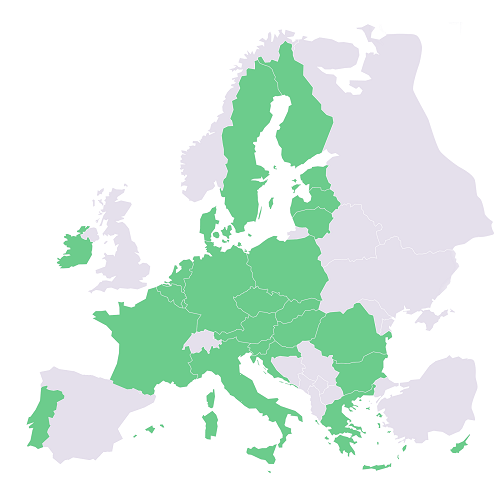
A small step for us. A big step for your case.
Unified Patent Court Your right. Europe-wide.
After a long period of uncertainty with many imponderables, the Agreement on a Unified Patent Court (UPCA) finally enters into force and the Unified Patent Court starts its work.
On 17 February 2023, Germany became the 17th member state to deposit its instrument of ratification of the UPCA with the Council of the European Union. The requirements for the entry into force of the UPC are thus now met.
The Unified Patent Court will now start its work on 1 June 2023. The so-called “sunrise period” has been running since 1 March 2023.
In order to prepare you in the best possible way for the start of the Unified Patent Court, we at Kather Augenstein have already dedicated ourselves for many years to this topic and have actively prepared ourselves to protect and enforce your legal interests also in this new legal system.
Member States Scope of the Unified Patent.
As of March 2023, 17 member states have ratified the UPCA so far: Austria, Belgium, Bulgaria, Denmark, Estonia, Finland, France, Germany, Italy, Latvia, Lithuania, Luxembourg, Malta, the Netherlands, Portugal, Slovenia and Sweden.
The effects of a Unitary Patent cover the territory of these member states. If the patentee wishes to obtain patent protection for additional member states that do not currently participate in the Unitary Patent System, he must additionally resort to national patents or to a European patent validated in these member states.
The remaining member states remain free to join the Unitary Patent System. This may result in Unitary Patents filed and granted later having a wider territorial scope of protection.

Basics
Unified Patent Court (UPC)
According to the provisions of the UPCA, the UPC is in particular (exclusively) competent for
- actions for actual or threatened infringements of patents and supplementary protection certificates and related defences, including counterclaims concerning licences,
- actions for declarations of non-infringement of patents and supplementary protection certificates
- actions for provisional and protective measures and injunctions,
- actions for revocation of patents and for declaration of invalidity of supplementary protection certificates,
- counterclaims for revocation of patents and for declaration of invalidity of supplementary protection certificates,
- actions for damages or compensation derived from the provisional protection conferred by a published European patent application, and
- actions relating to the use of the invention prior to the granting of the patent or to the right based on prior use of the invention.
It is important to note in this context that the Unified Patent Court will in principle have jurisdiction not only for Unitary Patents, but also in principle for classical European patents. This basic jurisdiction is only interrupted by two aspects:
- On the one hand, the UPC provides for a transitional period of seven years after its entry into force, which may be extended by up to seven years, during which actions for infringement or revocation of a European patent or actions for infringement or revocation of a supplementary protection certificate issued for a product protected by a European patent may continue to be brought before national courts or other competent national authorities.
- On the other hand, patentees or applicants for a European patent that has been applied for or granted before the expiry of the transitional period have the possibility to declare a so-called opt-out (see below in detail).
The effects of decisions of the Unified Patent Court extend to all member states that have ratified the UPC.
Patent with unitary effect
Up to now, there have been two options for patent protection for inventions in the European Union: firstly, protection via national patents, and secondly, protection via European patents. However, the European patent protection also has a national reference insofar as the European patent breaks down into a bundle of national patents upon grant and must be validated in the member states in order to take effect there. For this reason, the European patent is also known as the “bundle patent”.
In contrast, the European patent with unitary effect or “Unitary Patent” is a Community patent with original effect in all member states participating in the Unitary Patent System. Once granted by the European Patent Office, it remains one patent whose protection extends to the territory of the participating member states without requiring any additional validation by them.
The Unitary Patent does not replace the previous national and European patent protection, but will in future be available alongside it as a third option.
Strategy Opt-Out / Opt-In
The Unified Patent Court will not only have jurisdiction for proceedings relating to Unitary Patents, but also for those relating to classical European patents. However, during a transitional period of seven years from the entry into force of the UPC, which may be extended for a further period of up to seven years, actions for infringement or revocation concerning a European patent may still be brought before national courts or other competent national authorities.
Alternatively, since 1 March 2023, patentees have the option of declaring an opt-out with regard to their European patents, thus avoiding the competence of the Unified Patent Court for these European Patents. These patents can then only be enforced or challenged before the national courts. The request for an opt-out is free of charge and becomes effective when it is entered in the register of the Unified Patent Court. However, it can only be filed as long as the European patent is not and has not been subject of a proceeding before the Unified Patent Court.
In case the patentee decides in the course of time that the Unified Patent Court shall be competent for his European patents after all, in order to enforce them in this way before the Unified Patent Court in all participating member states, he is free to withdraw the opt-out again (“opt-in”). This request is also free of charge. However, this option is only available to the patentee if a national part of the patent is not and has not been already subject to a national proceeding.
As far as the advantages and disadvantages of an opt-out are concerned, the same applies here as for the Unitary Patent: an opt-out deprives the European patent of unitary enforceability at the Unified Patent Court, but also avoids the patent being uniformly nullified.


